by Jenny Rose | Dec 21, 2017 | A Flourishing Woman, The Journey
Yule, the winter solstice, is upon us once again. This year, here in the deeps of darkness, I’m thinking about The Fool’s journey.
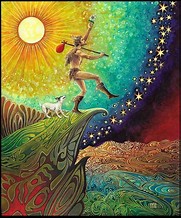
The Fool, by Emily Balivet
The Fool is an archetype, a recurrent symbol in mythology, folklore and story. Jack of Jack and the Beanstalk is a Fool. The Fool shows up as a simpleton, an innocent, one who is ignorant, inexperienced and silly. Archetypes have two sides, shadow and light. In modern culture The Fool has been reduced to its shadow, its most negative attributes, an insult, a curse and a contemptuous label.
But the old tales hint at a deeper, older meaning of the archetype. In fairy tales, The Fool is often the youngest sibling, the least able and powerful character, who nevertheless becomes the only one to successfully complete the task or quest. Often, The Fool has a good heart, or some extraordinary purity of character that allows him/her to be successful. The Fool has faith in magic, in talking birds and beasts, in the advice of old women, in objects given by peddlers at crossroads. To be a fool is to be held in a circle containing everything and nothing, to be without judgement, rules, expectations, cynicism or fear. The Fool is an archetype of youthful energy, bright, glowing and optimistic, filled with hopes and dreams.
Characters of this archetype set out, sometimes exiled or driven from their home, sometimes volunteering to go, with nothing but their shining confidence, intuition and willingness to do a task or find a solution. They rarely have external resource, but carry a great wealth of internal assets, including, interestingly, a kind of innocent cleverness that arises from authenticity and the simplicity of great integrity. The Fool has everything she or he needs in the form of untapped, chaotic potential.
It seems to me we’ve lost sight of the sacred role of The Fool. We kill foolish behavior with punishment, restriction, control, mocking and tribal shaming. We teach our children to avoid playing The Fool by making “good” choices. We avoid looking or feeling like fools. Foolishness is equated with immaturity, irresponsibility and naiveté. We resist being wrong or admitting we made a mistake. Playfulness is no longer a priority.
I see The Fool as an essential first step in The Hero’s journey. It’s where we all start as we undertake any new experience or endeavor. All Heroes start out as Fools, and perhaps all Fools are also Heroes. The Fool archetype creates space in which we learn resilience, strength, courage and creative problem solving. In the gap between The Fool’s happy hopes and dreams and reality is the place where Self is shaped, and the more fully we embrace this archetype, the more of our own potential we realize.
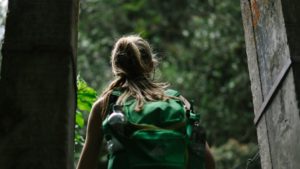
Photo by Dan Gold on Unsplash
That’s what I believe, when I think carefully about it, but that’s not how I show up in the world.
I hate to feel like a fool. Humiliation is one of the most uncomfortable emotions I experience. I dread appearing irresponsible or naïve. I’ve bought into the cultural definition of foolishness equaling stupidity, and I don’t want to be perceived as stupid. I’ve been warned at the beginning of every Fool’s journey I’ve embarked upon with head shaking, patronizing smiles and dire, ominous warnings: “You have no idea how hard marriage is.” “Boy, is your life going to change!” “You’re going to hate it!” “You’ll find out I was right!” “It won’t last.” “Nothing will ever be the same.”
As a parent, I shook my own head, smiled patronizingly and issued warnings. I wanted to protect my sons from “bad” choices, from danger, from illness and injury and from the pain of disillusionment and disappointment, the very things that help us figure out who we are.
The Fool is an archetype precisely because it’s so persistent and present in our lives. It’s our nature to go into the world and explore, seek, complete tasks and engage in quests. I wonder what it would be like if we all framed The Fool’s journey as sacred space, as a necessary and beautiful rite of passage, filled with potential and promise. In that case, revisiting this archetype throughout our lives at any age could be viewed as a chance to refresh our willingness, consent and curiosity about ourselves and what might be possible, a chance to apply the skills we’ve learned in our previous cycles as The Fool rather than stay frozen in bitterness, shame, regret and fear.
It’s true that every new journey is a risk. None of us could have imagined what it would be like to be an adult, to fall in love, to get married, to have children, to move across the country, to get the perfect job, to battle illness or injury, to age. Dire warnings and ominous predictions are pointless and useless as we navigate in our lives. Sincere and simple congratulations from others; faith in our own intuition, intelligence and strength and the experience of unconditional love and belief in our abilities from friends and family is what we need as we push forward in search of new horizons.
Yule signals the return of the light and new beginnings. We all embark on a new cycle, and none of us knows what it will bring. The Fool is tying together a bundle of food and setting out, following a new road into an unknown place, exploring, perhaps searching for something. Interested, curious, fearless and confident, The Fool walks into the future as the light strengthens once more.
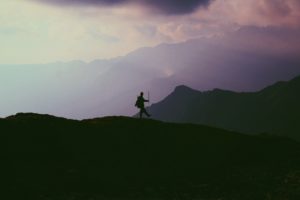
Photo by yatharth roy vibhakar on Unsplash
All content on this site ©2017
Jennifer Rose
except where otherwise noted
by Jenny Rose | Dec 7, 2017 | A Flourishing Woman, Mind
Scrying is “the practice of looking into a suitable medium in the hope of detecting significant messages or visions.” (Wikipedia)
My laptop has developed the Technical Flu and is in the shop. I’m chagrined to discover how much I depend on it. It’s the only portable device I have, as I still resist the pressure to obtain even a cell phone. Suddenly, my access to music, DVDs and the Internet is restricted. I know, it’s a first world problem, but I’m not complaining. I whined for the first few days, but as I sit down to write this post what I mostly feel is a kind of grateful wonder.
In my laptop’s absence I find a lot of quiet. Without my usual entertainment and distraction, my ears, eyes and attention are freed. As I work on the second book of my series, I’ve picked up a sketch pad and colored pencils in order to create a map of my very complex world where the myth, fairy tale and oral history of several cultures meet and interact. Without access to my one-dimensional outline on my word processor, I recognize the need for a two or even three-dimensional model to truly show all the connections and correspondences of the series. I’ve discovered new depths to my creative vision and work and considered new ways to approach it.
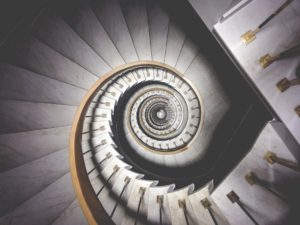
Photo by Ludde Lorentz on Unsplash
Folk and fairy tales often speak of depths. Caves, tunnels, wells and stairways descend to other places, magical underground kingdoms where evil beings lurk and flex their destructive forces and unexpected but powerful animals or crones or fairies save the hero or heroine. Gypsies, oracles, shamans and seers scry crystal balls or pools of water, smoke, fire, mirrors or stones. Runes whisper messages. Tarot cards reveal enigmatic insight.
We are in the depths of seasonal darkness now. In two weeks the light begins to return. Here in Maine the day starts to fade at 3:30 in the afternoon and an hour later it’s full dark. What do the depths of darkness hold? What lies between the stars? What dreams unfold behind our eyelids during the long sleeping hours? What lives, hunts and dies in the winter-bare forests under the moon? What stirs in the dark sea’s deeps?
If we could separate ourselves and all those around us from our tech and toys, if we could all free our eyes from the screen and our ears from the noise and look, clear-eyed and undistracted, at those around us, what would we see in one another? If we were forced to sit quietly at a window with nothing but a chair for company, what might we discover in the world around us? If we stand naked and alone in front of a mirror and look into our own eyes, what looks back at us?
What lies in the depths of longing and loss? What lies denied and amputated in the deeps of a soul? What waits to be rediscovered or reclaimed, healed or released?
Some of the deepest, darkest, coldest and most fearsome depths in my life turned out to be only ankle-deep after all. Ankle deep and unpleasant, but, once challenged and understood, pathetic and sad rather than powerful and terrible. Shallows pretending to be depths. A leech or two instead of a sea monster.
Other shallows are so seductive, so enticing, so shiny, that we joyously bare our feet and run into them, gradually wading farther and farther from shore, our attention captured, our gaze fixed on their captivating surface, and there we stay until we die.
All my life I’ve been told I’m too intense. I’ve never known exactly what that means, and the criticism never fails to both hurt and irritate, especially as I can’t get more information. Asking probing questions is simply an example of my obnoxious intensity, it appears.
I wonder this morning if what people are expressing is discomfort with my love for the depths, for the dark where miracles happen, for the hidden thing, be it dreadful or dazzling. Questioning is falling out of social favor. Political correctness shackles and gags us. The shiny shallows are the place to be, where text messages, emojis and ‘likes’ glitter and frolic and algorithms and ideology teach us what to think, believe, value and buy.
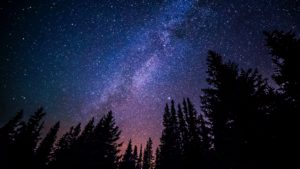
Photo by Ryan Hutton on Unsplash
I can be seduced by the shallows as well as anyone, and have several times been fooled by them, but somewhere inside me resides a wild thing, a female creature that glories in the power of the dark and deep and always returns to passion, emotion, and creativity. I want to dive into the night sky and swim naked among the stars and nebulae. I want to see and be seen, hear and be heard, know and be known. I navigate with a mouthful of questions and an insatiable curiosity. I don’t want life to be pretty and distracting and shiny. I don’t want all my dreams to be sunlit and filled with flowers and kittens.
I want life to be as it is, smelling of musk and blood and starlight, dark and powerful and magnificent beyond my puny imagination. I want the hot eroticism of life and the torn flesh of death. I want to embrace the unknowable, kiss the lips of mystery and reclaim and wield the full power of my fear.
I choose to live in the depths.
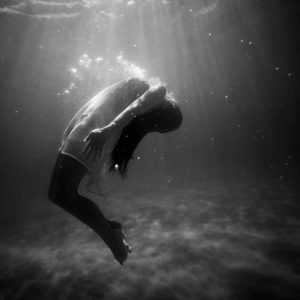
Photo by Christopher Campbell on Unsplash
All content on this site ©2017
Jennifer Rose
except where otherwise noted
by Jenny Rose | Sep 14, 2017 | Connection & Community, Emotional Intelligence, Shadows
Power lies beneath the layers at the center, the heart, the core. All avenues of thought, all paths of inquiry lead back to power. What is it? Who controls it? How do we manage and maintain it? Power is the fuel of life. Every relationship is rooted in power. Managing our power is the key to managing our lives at every level, physical, emotional, creative, sexual, spiritual and intellectual.
Narcissists stalk emotional power. They seek it, they lust for it, their voracious hunger and need drive them to control it. They are a yawning abyss that can never be filled because they lack the ability to generate their own emotional power. They will never cease hunting for prey.

Photo by Rain Wu on Unsplash
The prey of the narcissist is carefully addicted and programmed with romance, charisma, and sex into becoming emotional power machines, set and calibrated to take full advantage of finely-gauged specifications of the prey’s need and vulnerability, so as to provide an unending stream of high-quality emotional power on which the narcissist gorges at will: The fine wine of our love, the exotic spices of our passion, the honey of our confusion, the refreshing tang of our jealousy, the nectar of our anguish and the bitter dark chocolate of our despair. Eagerly, we spread our longings, hopes, fears and fantasies before the icy coruscating mirror concealing the narcissist’s true nature. Narcissists manufacture networks of emotional power machines and pit us against one another in order to obtain ever more abundant, complex and complicated fuel. We are not released until we malfunction, and then we’re contemptuously eliminated (but not freed) to make room for a shiny new machine, and we languish until called for again.

Photo by Gary Bendig on Unsplash
The only hope of escape and healing lies in power, the center, the heart, the core beneath the layers. We must cease to hoard, deny, silence, or give away our emotional power. We must claim it, excavate it, call it by name, learn the flavor and scent of it. We must weep with it, rage with it, release it in righteous orgasm, create with it, fight with it. We must look through its unclouded eyes and follow it, wherever it takes us. We must pray with it, surrender to it and adore it. We must soar within its rapturous fiery wings and plunge into its healing green water. We must build a cosmos out of our emotional power and fill it with galaxies, adorn it with jeweled planets and sow it with shooting stars.
We must defend our emotional power with our lives, for without it we cannot live. We must seduce and enchant ourselves with the rapture of our own emotional power so we cannot be captivated by the scintillating mirrored eyes of the narcissist, for if we’re captured by those mirrors we’ll find nothing but our enslavement and performance as emotional power machines reflected back to us, and the stench of the charnel house will invade our souls.

Photo by Aimee Vogelsang on Unsplash
We must look in those glittering mirror eyes, look deeply, look well, and say, “Ah, here is my own reflection, my ravishing emotional self, entirely naked and unashamed.” We must say, “No, I will not be your emotional power machine, no, you can give me nothing that wasn’t already mine, no, I name you Narcissist and I know your terrible secret: You are powerless without your prey,” and turn away, dance away with our bountiful bared breasts and strong hips, pressing our lips to our own shoulders with love because we have everything we need, everything we want, as we embrace our own emotional power beneath the layers in our center, in our heart, in our core.
For more information on recognizing, understanding and managing narcissists and their behaviors, explore narcsite dot com, created and written by a narcissist. If you suspect you have had or now have a narcissist in your life, read ‘The Prime Aims’ on that site for clarification. If you are now or have been entangled with a narcissist, seek help and support immediately if you have not already done so. Your life is at risk.
All content on this site ©2017
Jennifer Rose
except where otherwise noted
by Jenny Rose | Aug 10, 2017 | A Flourishing Woman, The Journey
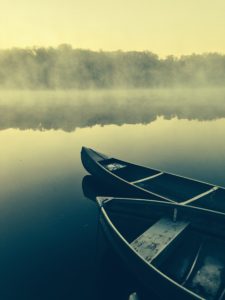
Photo by Andrew Montgomery on Unsplash
I often imagine life as a river and myself in a boat of my own making, floating on it. I don’t picture a sailboat, having no experience of one, but a small boat that glides with the current and can be paddled. I don’t imagine a single river, but a vast network, far more than I could ever explore in this lifetime. Sometimes it’s a river of water, sometimes a river of stars. Sometimes it’s a river of green moss carving a path through thick forest. Sometimes it’s an air-borne river of leaves and feathers and pieces of sky.
Sometimes it’s a river of stone.
The thing about rivers is they take me where they take me. I can paddle and steer, but whatever river I’m on at any given moment is a living thing in itself. I’m not its master and it doesn’t ask me where I want to go.
Of course, I don’t have to surrender to this kind of movement. I can refuse to make a boat in the first place, refuse to learn how, refuse to try. I can take a short cut and buy a premade boat or jump in someone else’s boat. If I do manage to create a boat, I can still make my way to the shore at any point and stop.
I can always throw myself out of the boat, too … but then I’ll never find out where the river is taking me.
I can also fight with the current.
I know a lot about this.
In the last few days, I’ve been floating on a river of stone.

Photo by Paul Van Cotthem on Unsplash
Stone is very, very, v…e…r…y slow. Oh, it moves, in the deep foundations of life. It shifts and compresses, slips, breaks down, heats and cools. It tells an old, old story, whole volumes of which are faded and weathered into illegibility, or hidden so well I know I’ll never read them. Now and then, though, a period of grace arrives in which I inadvertently enter a river of stone and have an opportunity, which I reject, avoid and try to escape, to hear whispers of stone stories.
During these times, others on the river are out of sight and out of hearing. My calls echo back to

Photo by Milada Vigerova on Unsplash
me off stone canyons and cliffs. I reach out for another in my sleep and wake with bloody knuckles. On the river of stone others do not respond. They don’t follow through. They don’t keep their word. My password doesn’t work. I can’t log on. There is no clarification or confirmation. I’m alone, in my little boat, and I feel adrift and forgotten, unseen and unheard, left behind.
The river of stone tells me a story of foundations, of beginnings, of layers of time and events, of family and tribe. My agenda, my insistence on movement and progress, my puny frustration with things not done, make less impression than a fragile-winged dragonfly that flung itself into the stone’s embrace uncounted aeons ago and flies now forever in the river of stone.
The river of stone is inexorable. It forces me to slow down. It provides me with no distraction and no easy entertainment. Creativity falls into sleep from which I cannot wake it. Those tasks and activities I call “productive” cease. Frantically, I paddle my boat, one side, then the other, until my hands are bloody blistered and my shoulders are a block of pain. All the old demons in my head leap into life, jeering and heckling, joining hands in gleeful celebration, and they have their way with me because I’m trapped in a river of stone.
I accomplish nothing on a list. I write no pages. Plans fall through. I wait too long to walk, and then it rains. Dirty dishes sit on the counter. All I want to do is get lost in an old familiar book — if only I could stay awake long enough!
Then, gradually, frustration, panic and fear exhaust themselves and lie down to rest. I rediscover the beauty of emptiness. I begin to see veins and gems and stardust in the stone around me. I remember the difference between doing and being, and the delicate balance they must maintain. The stone speaks to me of strength, of endurance, of centering and grounding. I give myself to the pause in communication and creative work. I put down the paddle, the oar, stretch out in the boat and rest, dreaming of stone-lipped wells refilling with spring water, dreaming of a spray of words leaping off waves or trailing behind stars in a river ahead, dreaming of friends whose faces I haven’t yet seen and broken connection repaired.
I doze, rocked in a cradle of stone. I rest, floating on a river of rock. I sink into the slow, deep, stony heartbeat in the center of all things, imagine inhalations and exhalations, each lasting 100,000 years.
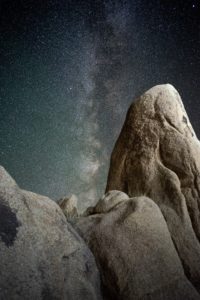
Photo by Brent Cox on Unsplash
I surrender to the river of stone, and in doing so I float out of it.
All content on this site ©2017
Jennifer Rose
except where otherwise noted
by Jenny Rose | Aug 3, 2017 | A Flourishing Woman, The Journey
I’ve been blogging now for a year.

Photo by Markus Spiske on Unsplash
I remember the first time I stood on a high diving board as a kid. The safe haven of the water was impossibly far away. I did eventually jump, but I stood, hesitating, for a long time.
Beginning to blog was like that. Could I manage the technological learning curve? Would I have time to do a good job? Did I have anything to say? Would I have to deal with spammers, hackers, hecklers and hate mail? Would anyone read it? And, the biggest Boogeyman of all, what would people think when I revealed who I really am?
I researched. I read dozens of articles on blogging. I made lists of do’s and don’ts. I bought a book on blogging.
I hesitated. I worried. I doubted myself. I clung to limits, obstacles and fears.
Then, in the middle of a personal and emotional catastrophe, the very last time I would have chosen or planned such a risky, frightening new endeavor, I suddenly started. I suppose I felt I had nothing more to lose.
This summer I’ve been taking stock of what I’ve created, what I’ve learned, my long list of mistakes and my intentions for the future. I’ve been a member of She Writes and Medium. I follow several other bloggers. I went into my Favorites and deleted most of my Blogging folder and then started filling it up again with new articles on Intermediate blogging.
There are hundreds, if not thousands of articles about blogging on the web. What I notice is 19 out of 20 are geared to successful blogging, which is to say blogging with the most possible likes, looks, shares, clicks, referrers, subscribers, advertising and side bar businesses, all of which can translate directly into income for the blogger. The Holy Grail is to go viral with your blog. To this end, the advice is repetitive. Use sentences of five words or less. Use short paragraphs of two or three sentences. Use lots of images, video, bullet points, colors, fonts and section titles. Keep your posts short and to the point. Carefully construct a title that will result in as many clicks as possible. Convince the reader you have something of value they need. Don’t be emotional or personal. You can’t be successful unless you have several active social media accounts.
I read, saved, took a few notes, and then realized I didn’t want to do most of what these articles said I should do. I paused and thought about that for a couple of days. I looked at my stats. I talked with my partner. I groped for a bottom line.
I absolutely love blogging/writing.
Why?
Because when I do it I’m real. Every single week I write about something real. Most weeks I struggle with what other people might think, but at the end of the struggle I again choose to be seen. I stare down that fear of using my voice and speaking up. I’m taking my power back, week by week, post by post, line by line.
Blogging and writing are my way of building bridges and fostering connection, to myself, to others, and to life. It’s the medicine I can offer to aid in healing. It’s my hug, my love letter to the world, my kiss of peace. It’s my outstretched hand, regardless of whether or not others choose to clasp it, ignore it or spit on it.

Photo by Alona Kraft on Unsplash
My feeling of success about writing a book and creating a blog isn’t attached to any of the general markers of success among bloggers. We have all kinds of programs that help us gather statistics on the web, but my heart doesn’t thrill to hundreds of clicks or fall if there are only five. None of these stats tell me anything about the quality of my contribution to my readers, and that’s the only stat that interests me. I don’t have anything to sell you. I don’t assume I have anything of value to you. I never expected to make money on my blog.
I just am. Myself is all I have to give, and what I really want from you is just … you.
I’ve been honored to achieve simple connection with others through Our Daily Crime. Some I know about, because people comment. I may be making other connections that remain invisible to me. Contrary to the best advice, I don’t have social media accounts. I don’t have a Facebook page. If a reader connects with my words or finds some kind of value in the experience I share and doesn’t comment or email me, I don’t know anything about it, but I have faith. I believe there are others out there who think about relationships, empowerment, being a woman, and what it means to be alive on Earth today. I believe there are readers who can deal with sentences more complex than five words and read a paragraph of several sentences. I think a post about rules for success should be titled, clearly and honestly, Rules For Success. I’m not a click bait engineer.
I don’t regret a minute of research or reading I’ve done about writing and blogging, and I wish those writing advice the success they seek. They’ve helped, especially their content that I couldn’t use. All those rules set off a lot of feelings. I hardly ever met a rule I didn’t want to challenge, and my feelings showed me the way into my own definition of success.
I find it useful to have goals and intentions, to know what kind of outcome I want, but the fact is I don’t always know. Some things are so unknown and such a personal leap of courage or faith that to insist on exactly defined goals before beginning is to never take action. Jumping inelegantly off the high dive into blogging was all I could manage last summer. I couldn’t define an audience, a goal or an intention, except that I was damned if I would let fear stop me from trying. It’s only now, 50 posts later, that I begin to understand what I’m up to, and it’s not necessarily the same as what other bloggers are up to.
Here’s my favorite story about success. This version is from One Bird One Stone by Sean Murphy.
For 40 years, a fisherman in China used a straight needle to fish. When someone asked him, “Why don’t you use a bent hook to fish with?” he replied, “You can catch ordinary fish with a bent hook, but I will catch an extraordinary fish with my straight needle.”
Word of this came to the ear of the Emperor, and he went to see this fool of a fisherman for himself. Laughing at the sight of the fisherman’s straight pin, the Emperor asked, “What are you fishing for?”
The fisherman said, “I’m fishing for you, Emperor.”
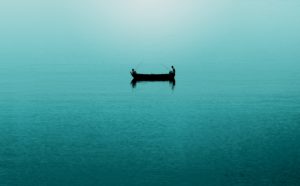
Photo by Steinar Engeland on Unsplash
Thank you for reading my blog. You’ve helped make it a success.
All content on this site ©2017
Jennifer Rose
except where otherwise noted















